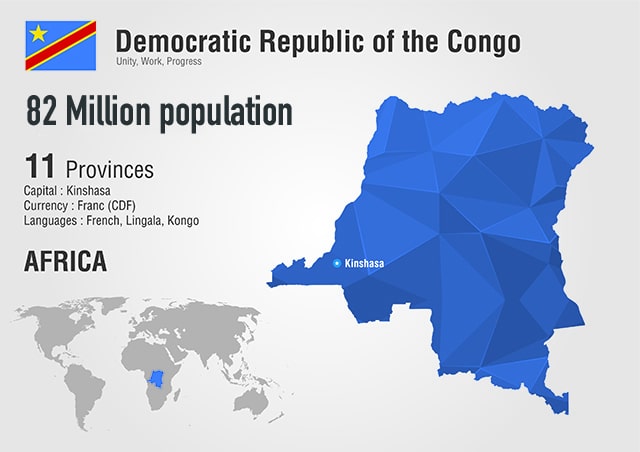The DRC has immense mineral resources and other investment opportunities, but they come with political corruption and risk.

|
CUBA: VITAL STATISTICS |
|---|
|
Location: Central Africa |
|
Neighbors: Republic of the Congo, Central African Republic, South Sudan, Uganda, Rwanda, Burundi, Tanzania, Zambia, Angola |
|
Capital city: Kinshasa |
|
Population (2017): 82,631,051 |
|
Official language: French, but four regional languages have official status |
|
GDP per capita (2016): $461.21 |
|
GDP growth (2016): 2.4% |
|
Inflation (2016): 6.9% |
|
Currency: Congolese Franc |
|
Investment promotion agency: National Agency for the Promotion of Investments |
|
Investment incentives available? Various tax breaks, durations vary by region |
|
Ease of Doing Business rank (2018): 182 |
|
Corruption Perceptions Index rank (2017): 161 |
|
Political risks: Uncertainty about whether elections will be held as scheduled in December 2018, after several postponements, and whether the president will accept the results |
|
Security risks: Sporadic but severe outbreaks of violence; kidnappings |
|
PROS |
|---|
|
General optimism for change among the population |
|
Plans for $1 billion deep-water port, which will enhance shipping capacity |
|
Expectations for a new era if elections are actually held in December |
|
CONS |
|---|
|
No letup of disturbances in sight |
|
New mining code has been ratified but with uncertain implementation |
|
High debt threatens airport operations |
|
Sources: Associated Press, CIA World Factbook, EBL News, International Monetary Fund, Newsbase, Reuters, Transparency International, World Bank, World Population Review |
|
For more information on The Democratic Republic of the Congo, check out Global Finance‘s DRC Economic Report data page. |
The (DRC), sometimes called Congo-Kinshasa (and frequently confused with the Republic of the Congo, called Congo-Brazzaville), clearly needs foreign direct investment (FDI).
For the DRC, the FDI mathematics are simple, according to economist A.L. Kitenge, president of Kinshasa-based consultancy Task Force Gouvernance-Finance and Innovation. “We are a country of 80 million people, and the budget is $4.5 billion,” he explains. “It’s not enough to fund total services to the public, so the only way to have investment is to go through FDI.”
The DRC has compelling investment targets, including an estimated 60% of the world’s reserves of cobalt, and large reserves of coltan, oil, gold, copper and other minerals. According to some, it has the world’s second-largest reserves of diamonds. In energy, FDI opportunities include a 44,000-megawatt project that still needs $100 billion to get up and running, Kitenge says. But it will support further growth. “To improve the FDI environment,” says John Nsana Kanyoni, managing director at Metachem Sarl, which is preparing feasibility studies for an eventual FDI proposal, “DRC requires a great deal of infrastructure.”
The US, UK and Canada have issued stern travel warnings. Protests, crimes, kidnappings and murders occur daily alongside a huge humanitarian crisis involving nearly 4 million displaced persons.
“There is quite a wide array of volatile, armed groups,” says Mati Yudelevich, senior intelligence manager in the Sub-Saharan Africa Division at MAX Security Solutions. “A lot of them are remnants from the war in the 1990s and early 2000s, and also the Rwandan genocide.” Originally formed as self-defense groups, they later turned to racketeering and roadblocks, he explains. Yudelevich ranks armed conflict between groups that cross over from neighboring countries, including Uganda, Burundi and Rwanda, as the nation’s top challenge.
“The other main problem,” he adds, “is corruption and accountability.” DRCongo ranks in the bottom ten of the World Bank’s 2018 Doing Business report. “It’s the result of the [president] Mobutu years,” Yudelevich notes.
Eastern DRC is rife with insecurity. Emblematic cases include the provinces of North Kivu, South Kivu and Ituri, he explains, where multinationals mine extensive mineral wealth. The capital of Kinshasa, Lualaba and Upper Katanga (with many mining operations), are somewhat safer.
Foreign debt is manageable, but the Congolese franc has been on a losing streak—down 24% against the US dollar in 2016 and another 22% in September 2017.
Given the risks, many investors favor a wait-and-see approach, according to a report by African Sunrise Partners. Certain sectors might thrive if the country achieves some political stability. Improved rule of law could strengthen the business environment and boost demand in core sectors. Telecommunications, banking, cement, agribusiness and food production, construction, property, hotels, power, machinery and low-end consumer goods are prime examples.



